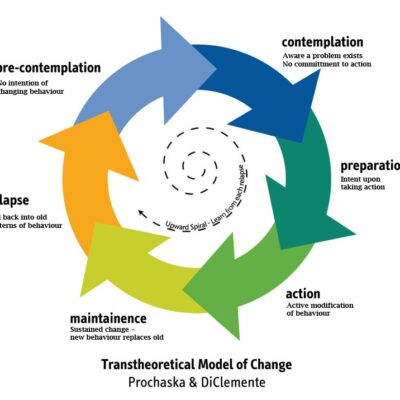Understanding the stages of change is a fundamental aspect of the therapeutic journey towards personal growth and healing. As a therapist, I value the fluidity of this process and the importance of allowing individuals the space to move between contemplation and action at their own pace.
In therapy, we acknowledge that change doesn’t follow a straight path. There are moments of contemplation where individuals reflect on the possibility of change but might not feel fully ready to take action. These moments are essential for self-reflection and understanding. As we move through change, we move forward and backward between stages of change. This can best be illustrated by the transtheoretical model proposed by Prochaska and DiClemente in the 1970s (see the image (Simcha, 2024).
The Stages of Change in Relation to Therapy Gains
Here’s a breakdown of each stage of the Prochaska model, incorporating relevant research findings:
1. Precontemplation:
This initial stage reflects a lack of awareness or denial regarding the need for change. Individuals in this stage might not see their behavior as problematic or may feel demotivated to alter it. Research by Prochaska and DiClemente (1983) suggests that interventions at this stage should aim to raise awareness without inducing defensiveness. Motivational interviewing techniques can be effective, emphasizing empathy and understanding rather than confrontation.
2. Contemplation:
During this stage, individuals acknowledge the need for change but might feel ambivalent about taking action. They weigh the pros and cons, oscillating between commitment and resistance. Studies (Prochaska, Redding, & Evers, 2008) recommend guiding individuals toward resolving this ambivalence by exploring the benefits of change and the consequences of maintaining the current behavior.
3. Preparation:
In the preparation stage, individuals become more committed to change. They might actively seek information, set goals, and prepare a plan for action. According to Velicer, DiClemente, Rossi, and Prochaska (1990), interventions during this phase focus on bolstering self-efficacy, encouraging small steps toward change, and providing tools to initiate the transformation process.
4. Action:
This stage involves implementing the planned changes. Individuals modify their behavior, environment, or thinking patterns. Research (Prochaska, Norcross, & DiClemente, 1994) highlights the significance of social support, coping strategies, and continuous reinforcement to sustain the momentum during this phase.
5. Maintenance:
After successfully adopting new behaviors, the focus shifts to sustaining these changes and preventing relapse. This phase involves consolidating new habits and addressing potential triggers or challenges that might lead to regression. Findings by DiClemente and Prochaska (1985) suggest that ongoing support, positive reinforcement, and coping strategies play pivotal roles in maintaining progress.
6. Termination:
The final stage represents a point where the new behavior becomes ingrained, and the risk of relapse significantly diminishes. Although not everyone reaches this stage, those who do exhibit a stable and sustained change. Research by Prochaska, DiClemente, and Norcross (1992) highlights that celebrating successes and promoting self-efficacy can help individuals consolidate their achievements.
By acknowledging and understanding these distinct stages, therapists can tailor interventions and support strategies that align with an individual’s readiness for change, facilitating a smoother and more successful transformation journey.
A therapist provides a supportive environment where individuals can explore their thoughts and emotions, allowing them the necessary time to align their desire for change with their readiness to take action. Rushing through this contemplative phase can hinder genuine progress.
Each individual’s journey through change is unique, and I’m here to meet you where you are in that journey. Whether you’re contemplating change or taking active steps towards it, my aim is to offer support and guidance, understanding the importance of honoring your pace and your readiness for transformation.

